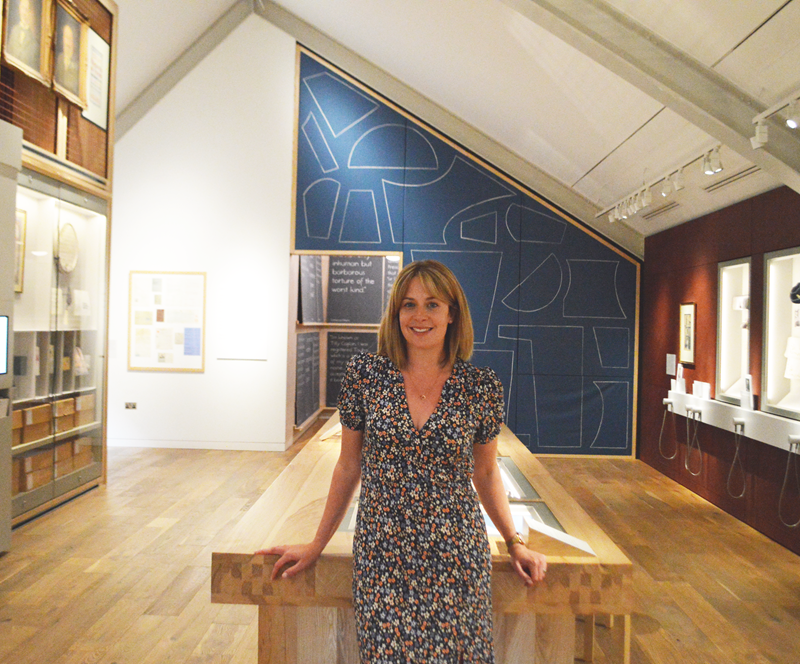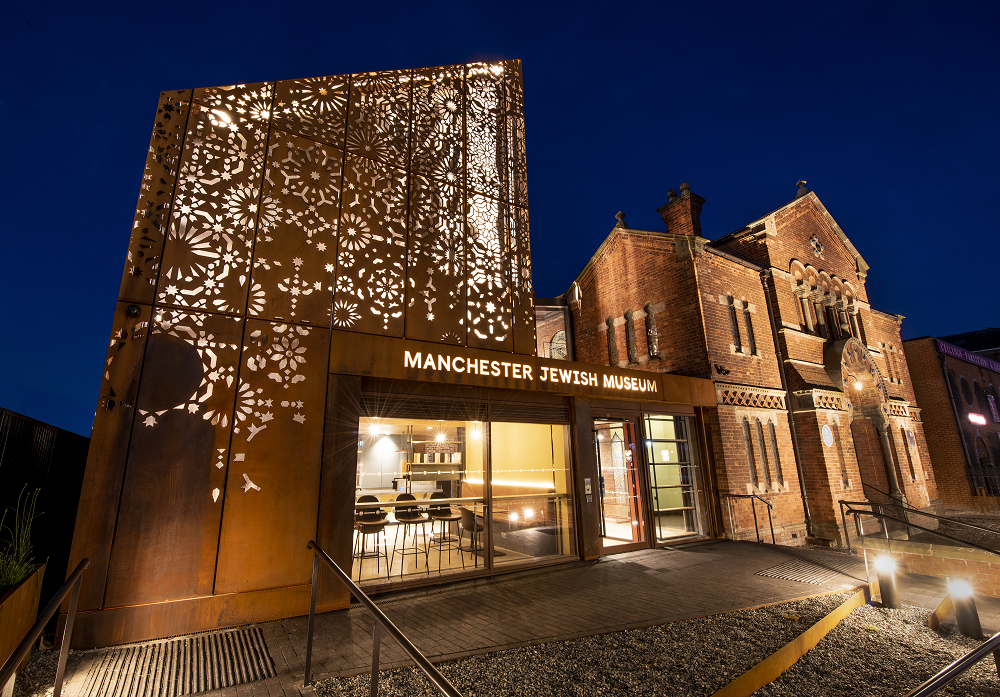“This play is a celebration of language. The language creates the space.” – interview with Jessica Litwak
On Thursday, 22 June, Jessica Litwak, a U.S. based playwright and actor, will stage her new play, “My Heart is at the East”, in Manchester Jewish Museum’s former Sephardi synagogue. We speak to Jessica about the importance of interfaith dialogue and making connections and how it’s reflected in the play.
Jessica Litwak is a U.S. based playwright and actor and a recognized leader in the field of creative activism and socially engaged theatre. She utilizes her passion for theatre and art to support individuals towards self expression and teamwork. She accomplishes this through her professional therapeutic practice experience and enthusiasm for social justice and international collaboration.
Her plays have been produced across the United States at theatres such as the Rattlestick and La MaMa in New York, as well as The Goodman Theatre in Chicago.
This month Jessica, together with AZ Theatre, will bring her new play, “My Heart is in the East” to Manchester Jewish Museum for an evening of theatre, poetry and discussion on interfaith with the museum’s audiences and local communities. In this interview we ask her about the idea behind the play and why she thinks it is key to look at what binds us together, rather than what divides us.
BOOK TICKETS FOR “MY HEART IS IN THE EAST”
Hello Jessica, it’s great to meet you! Can you tell us a bit more about yourself and your background?
I am a playwright, actor, creative coach, educator, a puppet builder, cultural critic, and drama therapist all in the field of socially engaged theatre. My plays have been produced Off Broadway and on stages across the U.S., Europe, and the Middle East, published by No Passport Press, TCG, Applause Books, Smith and Krause, and The New York Times, Drama Therapy Review, Engaged Scholar Journal, HowlRound, and TCG Salon.
As an actress I have performed extensively on stages across the U.S. and in Europe, she has appeared in film, television and radio.
As a director I have worked globally often funded by the U.S. State Department in the Czech Republic India, and Scotland.
I am a graduate of the Royal Academy of Dramatic Art, the Experimental Theatre Wing at NYU, I have MFA in playwriting from Columbia University, and a Ph.D. in Theatre as Leadership.
I founded the H.E.A.T. Collective (www.theheatcollective.org) in order to coalesce the practices of Healing, Education, and Activism through Theatre.
I also founded and ran Artists Rise Up New York, designed to create free theatre actions in response to the needs of the community. I am a core member of Theatre Without Borders and a Fulbright Scholar.
What is the “My Heart is in the East” project about and how did it start?
My Heart is in the East is a play that takes place in two realms: Present-day Iraq and Medieval Spain where spoken word poetry contests contributed to communication and Muslims and Jews lived in a state of coexistence and cultural exchange. In New York a Jewish American professor (Miri) receives an invitation to Basra, Iraq to lead a series of puppet building workshops. An Iraqi Muslim (Ishmael), a street poet who is currently employed as a mercenary gravedigger is hired to be her translator.
Their relationship is both discordant and interdependent as they travel to Beirut and finally find themselves in the anteroom of the large poetry contest 1,000 years earlier in Cordoba, Spain. The play uses magical realism, music, puppets to carry us through time and space.
At the core of the story is a rich and complex relationship between two actors, the characters they play and the language they speak. Audience members have said: “This play is a celebration of language. The language creates the space. I understood that people could live on poetry.”
You’re not only the playwright behind “My Heart is in the East”, but also one of the two performers on stage. Tell us a bit more about Miri and Aviva, the two roles that you’re going to play. Who are they?
Miri is based on a version of me during my time teaching in Iraq. With her I have also explored the fine line between true artistic openhearted support and western privileged saviour syndrome. What she learns about herself in this process is key to a deeper, more effective ongoing life and work practice.
Aviva is an imagined character from Ancient Cordoba, based on my research about Jewish and Muslim poets during the Golden Age, about one thousand years ago.
Why do you think it’s so important today to create space for discussions on interfaith, our similarities and differences?
This is a great question! I think we are in a time of increased Islamophobia, Anti-Semitism, Xenophobia, cultural division and anxiety. Through history we can re-frame the present and re-shape the future.
There was a time when Jews, Muslims and Christians lived together harmoniously and the Arts and Sciences flourished: Spain 1000 years ago. “My Heart is in the East” crosses divides to open up the possibilities of dialogue in the minds of the audience: East / West; ancient / contemporary; women / men; Muslim / Jew – with insight, wit, humour and the transformative power of language. Cordoba thus becomes a code for creative coexistence.
What excites you most about staging MHIITE at Manchester Jewish Museum’s historic synagogue?
I love that we are engaging with a community that expands beyond theatre folk and gives us the opportunity to have some discussion in a multifaith context. I also have loved working with The Jewish Museum virtually and I am so excited to be there in person and actually perform in an ancient Sephardic space that feels so right for the part of the play that takes place in medieval Spain.
How do you see MHIITE developing in future? What should we look out for?
This team has been working together for some years now although this is our very first presentation that is not a reading. We will be developing a fully produced tour of the play throughout Europe and the UK once we are able to secure the funding. This version is “bare bones” as a way to bring the piece to Northern England with virtually no costumes, set or props. We hope to come back with lights and settings.








